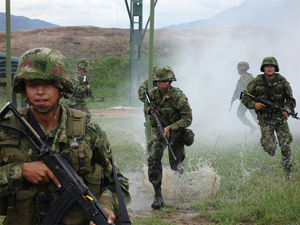Operation Eternal Steel
| Operation Eternal Steel | |||||||
|---|---|---|---|---|---|---|---|
 Alexandrian troops in New Alexandria |
|||||||
|
|||||||
| Belligerents | |||||||
| Commanders and leaders | |||||||
| Units involved | |||||||
The Biological Attack
Over the course of the last three years, an underground terrorist group called the ''Falange para la Liberacion Indigena'' (FLI), or the Movement for Indigenous Liberation, was working diligently to trigger a large-scale biological attack in the cities of Geneva, Edgardia and Rennes. The FLI is an organization that has its sole aim set as "the liberation and independence of the indigenous peoples of the territory of New Alexandria". Since 1975, it had a cease-fire agreement with the Alexandrian Government, and it had disarmed and turned into the Partido Social Indigena, a leftist political party. Young natives in the 1990's began to recreate the Falange, enthused by the writings and speeches of Jose Acosta. His writings, in particular his book Nacionalismo Revolucionario Indigena (Revolutionary Indigenous Nationalism), advocated the violent overthrow of the Alexandrian colonial government and the use of guerrilla tactics and terrorism to do so. Funded by the donations of locals as well as foreign sources, the newly-reformed Falange secured the material needed to launch a massive biological attack using strands of the ebola, anthrax, and the Marburg virus.
The Falange worked for three years to reach and infect local water supplies, as well as food supplies and the steam system in Geneva and Edgardia used to heat, cool, or supply power to high rise buildings and businesses. In October 10th, 2008, in the midst of a hotly-contested general election, a group of twenty-five young men released the different viruses, while coordinating attacks on the power grid of the cities. For eight days, half of the city of Geneva was without power - the half that contained the bustling medical district of the city. The city of Edgardia was able to reestablish power in two days. Rennes law enforcement officials managed to breakup the attack on the power grid there. However, the viruses were deployed and millions in these cities were infected.
The immense pressure on the health care system of these cities was tremendous. It caught the system off-guard and threw the entire country in chaos. The government of the outgoing First Consul, Conservative Jose Frias, reacted slowly and failed to adequately deploy the necessary resources to treat the victims. Around the country, almost a million Alexandrians. Over the course of the tragedy, 34,900 would die from lack of adequate health care. The public health care system neared collapse as overworked health care employees threatened to strike. The Minister of Health, Jacques Germaux, committed suicide in his office.
The attack led the Parliament to approve a full suspension of the Constitution, as well as the declaration of a state of emergency and the cancellation of the upcoming elections. The Emperor went on national television, urging the country to "unite and fight to save the lives of our countrymen, and seek those who did this so justice can be served" The cities of Geneva, Edgardia, Rennes, Guaynabo, Markion and Franciscania were placed under direct martial law and quarantined.
Conclusion: May 16, 2010
Ahuitzotl Maquahuitl Cuauhtli was captured by Alexandrian soldiers last week in a daring operation to nab the terrorist leader. Dozens of other FLI leaders were killed or captured in the daring special forces raid. Meanwhile, the Alexandrian armed forces launched overwhelming assaults across New Alexandria which destroyed or captured all remaining FLI units. Today, at 11:30 AM EST the FLI movement formally surrendered to Alexandrian soldiers, with Tupac Amaru Guevera declaring the unconditional surrender of all FLI guerillas.
The speedy elimination of the terrorist insurgency in the New Alexandrian province was accomplished by a combination of brute military force coupled with aggressive counterinsurgency measures. Total casualties on the Alexandrian side run around 5,000, while FLI's run around an estimated 20,000. Civilian casualties are unknown, but estimated at anywhere from 40,000 to 100,00. The conflict has wrecked much of the province's infrastructure, transport, and communications systems and it will cost a considerable amount to rebuild not only the physical damage, but repair the emotional and mental wounds of this war. However, it seems that the Alexandrian armed forces have won a hard-won victory against a foe many assumed was winning as late as April 2010. Nonetheless, it is now up to the government to secure the peace and restore law and order as well as basic government services to this shattered province.
See also: Alexandrian Flu

